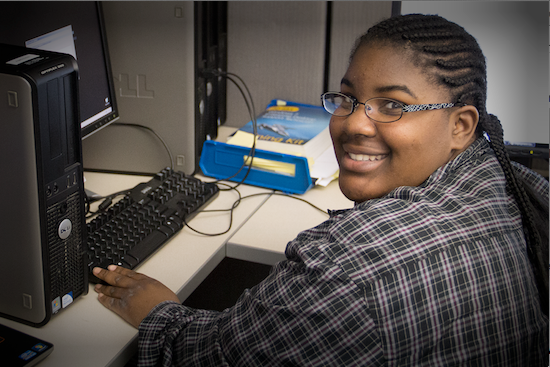IT Career Academy diversifies the IT workforce

Latoria Isom, a graduate of the ITCA, now works at Administrative information Management Systems (AIMS) as an IS Technical Support Technician.
Photos: Justin Masuga
Latoria Isom, a recently hired IS Technical Support Technician at UW–Madison’s Administrative Information Management Systems (AIMS), loves her job of installing and repairing computers for faculty and staff throughout campus. “There’s always something new to learn,” she says. “I don’t like to be bored and it’s never the same thing.”
That love of learning helped Isom develop her new technology repair skills. She graduated from the pilot IT Career Academy (ITCA), a training program developed through a partnership with AIMS, the Division of Information Technology (DoIT), the Urban League of Greater Madison (ULGM), and INOC, a private business in Madison.
When she was looking for a job, Isom learned of the ITCA through the Urban League Foundations Program and knew that the Urban League’s trainings had the reputation of placing participants in jobs when they were finished. Despite not having any professional IT experience, she was intrigued by the hardware repair component and thought that her hobby of repairing game consoles might come in handy.
“I’m a single mom and needed to make more money,” she says. “I would have tried anything.”

As an IS Technical Support Technician, Isom installs and repairs computers for faculty and staff throughout campus.
The ITCA’s mission is to create a more diverse IT workforce. The training sends participants through an intensive six-week, full-time training that covers the depth and breadth of IT basics — hardware, software, networking, help desk operations — and includes the opportunity to learn by job shadowing and field experience.
ITCA graduated its first class of six students in November 2012. Five of the participants were women and three of them were African-Americans, both demographic groups that are historically underrepresented in the IT field. Four of the graduates are currently employed by AIMS or DoIT, one is working in private industry, and one is still looking for work with some promising leads.
The ITCA was born of an idea for collaboration in 2011 and took off from there. Sara Tate, Team Lead for Customer Engagement and Learning Services at AIMS, who has a background in education and IT, joined the team in 2011 to work on developing curriculum for the program. “I started by asking what skills the participants would need to acquire to obtain entry level IT positions,” Tate says, “and then built lesson plans into that framework.”
Staff from DoIT, AIMS, and INOC teach the classroom portions of the training. Much of the classroom work is hands-on. For example, the troubleshooting lesson, taught by Tate, had students spend five minutes each with six different computer stations, attempting to diagnose an unknown problem. The situations are similar to real-world issues they would confront working at a help desk and “I was impressed [with] the amount of IT troubleshooting knowledge they had picked up in a short period of time,” says Tate.
The field experience included job shadowing at both DoIT and AIMS. Some students were given a firsthand look at what a day working at a help desk would look like. Others shadowed the field services team and helped prepare and install new PCs for customers.
By many measures, the pilot has been a success. For Tate, it was “one of the most intrinsically rewarding experiences I’ve had in my career to see the pilot successfully go from idea to execution.” For Isom, it has lead to a new career path and goals. She plans to enroll in Madison Area Technical College this summer to obtain her associate degree in computer sciences. For the pilot program, these results merit doing it again, Tate says.
The program plans to enroll a second class of students in the fall of 2013 and is looking for interested partners on campus who might want to participate. Partners can get involved in a variety of ways: hosting students to job shadow or do field experience; they might also be interested in hiring the students once they complete the training.
In a field that struggles to attract a diverse workforce, ITCA gives hope as a model that can successfully recruit professionals from a wide variety of backgrounds, making IT more accessible to all.
For more information about participating as a partner, email Kathy Konicek, kkonicek@doit.wisc.edu. To apply to the program, contact the Urban League of Greater Madison at 608-729-1200 for more information.
—Katie Krueger
Tags: diversity, Information Technology, learning
